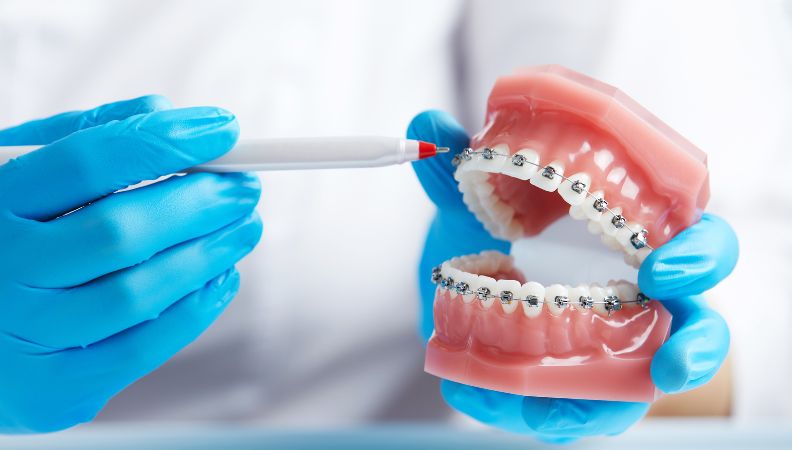Monday - Tuesday:9am - 6pm
Friday - Sunday:8am - 5pm
Sunday: Closed

Dental crowns are a popular solution for patients with damaged, decayed, or misshapen teeth. They are custom-made caps that cover the entire tooth, restoring its strength, size, and shape. Whether you’ve had a root canal, a large cavity, or a broken tooth, a dental crown can help protect and restore the tooth to its natural form. In this article, we’ll explore the different types of dental crowns, the benefits, the cost involved, and how to take care of them. By the end, you’ll have all the information you need to make an informed decision about dental crowns.
Dental crowns offer a variety of benefits for those who are looking to restore the function and appearance of their teeth. Let’s look at the most significant reasons why someone might choose to get a dental crown.
Strengthens Weakened Teeth
If you have a tooth that is cracked, weakened, or has a large filling, a crown can provide the extra strength to make the tooth functional again.
Improves Aesthetics
Crowns are customizable in color and shape to match your natural teeth, making them ideal for restoring teeth that are visible when you smile.
Restores Function
Dental crowns can restore the full functionality of your tooth, helping you to chew, speak, and eat properly.
Prevents Further Damage
A dental crown protects your existing tooth from further decay or cracking, ensuring that the tooth remains intact for a longer period.
There are several different types of dental crowns, each made from different materials. The choice of material depends on the location of the tooth, the function required, and personal preferences. Here are the most common types of crowns.
Porcelain crowns are highly popular because they can be made to match the color of your natural teeth. They are ideal for front teeth or teeth that are visible when you smile.
These crowns are made from a variety of metals, including gold, platinum, or a combination of metals. Metal crowns are durable and resistant to wear and tear, but they are often used for back teeth because of their appearance.
Ceramic crowns are another aesthetic option, offering a natural appearance similar to porcelain crowns. They are commonly used for front teeth, but they are not as durable as metal crowns.
Resin crowns are made from a dental composite material. They are typically less expensive but are also more prone to wear and tear compared to other crown materials.
The process of getting a dental crown usually requires two visits to the dentist. Here’s a step-by-step breakdown of the process:
The first visit involves a consultation, where the dentist examines your tooth and determines if a crown is needed. They will then prepare the tooth by removing any decayed or damaged tissue.
After preparing the tooth, the dentist takes an impression of the tooth to create a custom crown. While waiting for the permanent crown to be made, you’ll be fitted with a temporary crown to protect the tooth.
Once your custom crown is ready, you’ll return to the dentist’s office. The dentist will remove the temporary crown and place the permanent crown on your tooth, making adjustments as needed for a comfortable fit.
The cost of a dental crown can vary widely depending on several factors, such as the type of material used, the location of the dentist, and whether you have dental insurance. On average, dental crowns can range from $800 to $2,000 per tooth.
Here’s a breakdown of potential costs:
Insurance often covers a portion of the cost, but it’s essential to check with your provider to determine your coverage.
Proper maintenance is crucial to ensure that your dental crown lasts for many years. Here’s how to take care of it:
Brush your teeth at least twice a day and floss regularly to keep your crown and the surrounding teeth healthy.
To avoid damaging your crown, steer clear of chewing hard foods, ice, or anything that could cause your crown to crack or chip.
Schedule regular check-ups with your dentist to monitor the health of your crown and ensure it’s still in good condition.
Dental crowns can last between 10 and 15 years, depending on the material used and how well you take care of them.Do dental crowns hurt?
The procedure itself is usually not painful because the area is numbed before treatment. However, some mild discomfort may be felt after the crown is placed.
Yes, if your crown becomes damaged or wears out over time, it can be replaced with a new one.
Many dental insurance plans cover a portion of the cost of dental crowns, but you’ll need to check with your insurer to confirm the details of your coverage.
If your dental crown falls off, contact your dentist as soon as possible. They may be able to reattach it or replace it if needed.
Copyright 2025 Mediax. All Rights Reserved.